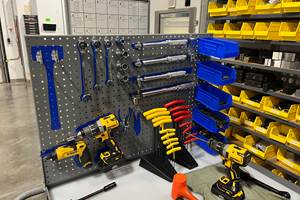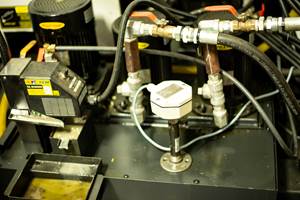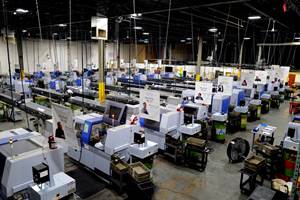Manufacturing Cell Boosts Profits And Flexibility
One machine shop owner in old New England, not far from where Paul Revere made his famous ride, saw a tight labor market as a call to revolutionize his company.
Share







ECi Software Solutions, Inc.
Featured Content
View More
Autodesk, Inc.
Featured Content
View More.png;maxWidth=45)
DMG MORI - Cincinnati
Featured Content
View MoreOne machine shop owner in old New England, not far from where Paul Revere made his famous ride, saw a tight labor market as a call to revolutionize his company.
Little Enterprises (Ipswich, Massachusetts) is in the semiconductor-manufacturing corridor of the East Coast. Many of the parts it manufactures are components for robots that are used as material handlers for silicon chips. Some parts are extremely complex and often one-of-a-kind prototypes.
Faced with the increased demands of a booming semi-conductor industry, President Scott Little says he had to change the way he produced these parts. Many of the CNC machine tools in his shop were vertical machining centers. Mr. Little said that he was only getting about 50 percent spindle utilization with these machines, because when parts were being loaded or unloaded, a machine sat idle.
Mr. Little researched how a horizontal machining center could cut costs by reducing his need for operators and giving him greater spindle uptime. To gain this advantage, he invested in a Mazak FH-4800 horizontal machining center with a two-pallet system. He says this machine gave him double the spindle usage due to its two-pallet system and faster toolchange time. But this stand-alone machine was not his ultimate manufacturing vision. His aim was to increase production using an unattended system that had the flexibility to grow with his manufacturing needs.
Mr. Little has expanded his one-machine setup into a Palletech Manufacturing Cell that includes four FH-4800 horizontal machining centers and 36 pallet stations with one load/unload station. Now he only needs one full-time operator to load and unload parts for the machines.
"We're in the semi-conductor business, which is a very difficult business because of its cyclical nature," Mr. Little says. "The last full industry downturn left me with over $1 million in inventoried parts. During the next slowdown, we'll have a million dollars of cash in the bank and no large inventory to worry about because of the way the Palletech has changed my business."
Mr. Little adds, "There is only one way to manufacture parts efficiently, and that's with automation. We came from being number 25 as a supplier to one of our largest clients to being one of its top three because of the capabilities that Mazak's Palletech Manufacturing Cell system gives us."
Mr. Little says that the Palletech system allows the company to be competitive. "We have increased our production capability. Not because of the increase in the number of spindles running, but rather, we virtually eliminated setup time for loading and unloading parts for each machine. At the same time, we ran every machine longer due to unattended machining. We currently have spindle utilization approaching 85 to 90 percent. We can handle volume production as well as a lot size of one. Or we can easily mix and vary our production runs. Each machine has 120 tools stored in the magazine. This allows us to produce a variety of different parts with the tools or have redundant tools for long part runs. By increasing the number of pallets we have, we can easily adjust our production schedules to meet any delivery."
Mr. Little acknowledges that Mazak's Palletech was a large investment for a shop of his size. But because of its modularity (the ability to add machines only when they are needed), he can make it grow as he needs more capacity. Also, with the Palletech able to do so much production, his labor rate per part has been dramatically reduced. Instead of having one person tend to one or two machines and wait for a part to finish, the Palletech allows one person to load/unload parts for all four machines with little idle time. Mr. Little is running the Palletech system 24 hours a day, 6 days a week with several hours each day of production without an operator.
"The big savings is labor," Mr. Little says. "We don't have to tie up a highly skilled machinist to monitor each machine and load/unload the parts when it's done. The time can be used to develop new fixtures, select cutting tools, do test cuts and improve the machining process. Machines just keep running and making chips without interruption."
Comparing vertical machining centers to the horizontals, Mr. Little says, "We probably would have needed another ten vertical machines with another 20 operators to do the same amount of work as just three horizontals in the Palletech system."
Related Content
Translating a Prototyping Mindset to Production
The experimental mindset that benefited BDE Manufacturing Technologies as a prototype job shop has given it an adaptable edge as a production facility.
Read MoreManaging Coolant with Skimmers, Refractometers and More
Bacteria-infected coolant harms machines and sickens machinists. Coolant management technologies like skimmers and automated systems counter this tendency.
Read MoreInside the Premium Machine Shop Making Fasteners
AMPG can’t help but take risks — its management doesn’t know how to run machines. But these risks have enabled it to become a runaway success in its market.
Read More3 Ways Artificial Intelligence Will Revolutionize Machine Shops
AI will become a tool to increase productivity in the same way that robotics has.
Read MoreRead Next
5 Rules of Thumb for Buying CNC Machine Tools
Use these tips to carefully plan your machine tool purchases and to avoid regretting your decision later.
Read MoreRegistration Now Open for the Precision Machining Technology Show (PMTS) 2025
The precision machining industry’s premier event returns to Cleveland, OH, April 1-3.
Read MoreBuilding Out a Foundation for Student Machinists
Autodesk and Haas have teamed up to produce an introductory course for students that covers the basics of CAD, CAM and CNC while providing them with a portfolio part.
Read More

























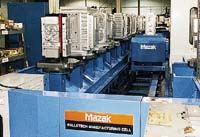
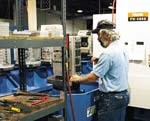





.jpg;maxWidth=300;quality=90)









